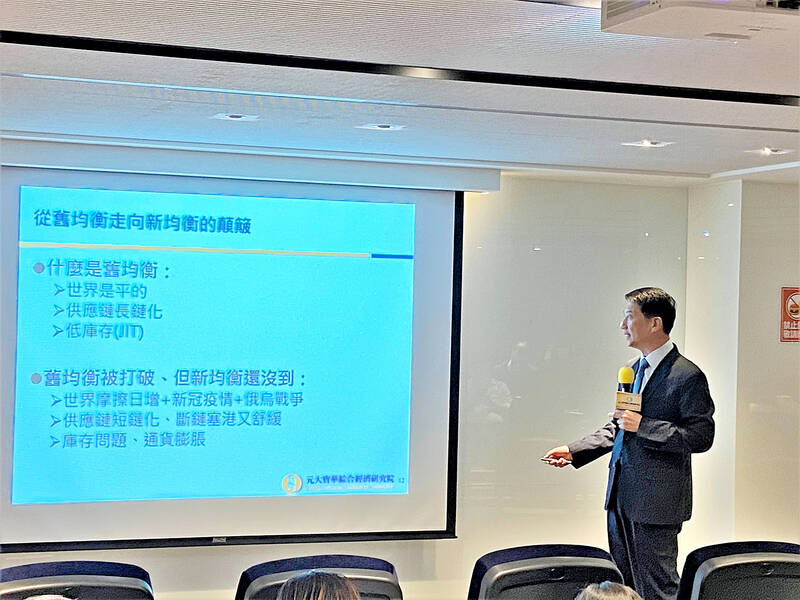Taiwan’s economy would expand 3.4 percent this year as it slows down from last year’s COVID-19 pandemic-induced boom while keeping in line with historic trends, the Yuanta-Polaris Research Institute (元大寶華綜經院) said yesterday.
Ongoing inventory corrections are caused by overbooking during COVID-19 lockdowns, rather than a decline in global demand for goods and services, institute president Charles Yeh (葉銀華) said.
The corrections could end in the first quarter of next year, Yeh said.

Photo: Huang Tzu-hsun, Taipei Times
“Taiwan’s GDP would put up a normal, acceptable growth of 3.4 percent this year, compared with a 12-year-high of 6.57 percent last year,” as COVID-19-induced demand for remote working and learning wanes, he said.
As local manufacturers would need four quarters to digest excess inventory, Taiwan’s economic growth would weaken to 2.75 percent next quarter and 1.65 percent in the first quarter of next year before bouncing back, Yeh said.
Exports of non-tech products slipped into the contraction zone last month and might encounter further headwinds as central banks tighten their monetary policies to curb inflation, he added.
The scenario would allow domestic demand to replace exports as the main growth driver, the institute said.
Private investment is expected to increase 6.89 percent this year, propped up by robust global demand for chips used in smartphones, laptops, vehicles, data centers, and artificial intelligence and Internet of Things applications, it said.
Private consumption would rise 3.19 percent this year, with an expected gain of 6.51 percent this quarter and 2.95 percent in the fourth quarter, the institute said.
The projection assumes consumer spending returning to pre-pandemic levels — with people becoming used to living with the virus and authorities gradually lifting disease control measures, it said.
Inflationary pressures, a key threat to consumer spending, would climb 2.94 percent this year, suggesting a 3.01 percent pickup this quarter and a 2.49 percent rise in the fourth quarter, it said.
Consumer prices would soften below the 2 percent alert level to 1.69 percent next year, it said.
The forecast assumes the central bank would raise interest rates by another 0.125 percentage points today to tame inflation, much lower than the US Federal Reserve’s 0.75 percentage point rate hike, Yeh said.
Capital flight would persist as portfolio managers at home and abroad respond to Taiwan’s widening rate gap with the US, he said.
The local bourse and the New Taiwan dollar would be affected amid fund redeployment, he added.
The capital movements would not become uncontrollable and could turn around in the coming six months, Yeh said.

SELL-OFF: Investors expect tariff-driven volatility as the local boarse reopens today, while analysts say government support and solid fundamentals would steady sentiment Local investors are bracing for a sharp market downturn today as the nation’s financial markets resume trading following a two-day closure for national holidays before the weekend, with sentiment rattled by US President Donald Trump’s sweeping tariff announcement. Trump’s unveiling of new “reciprocal tariffs” on Wednesday triggered a sell-off in global markets, with the FTSE Taiwan Index Futures — a benchmark for Taiwanese equities traded in Singapore — tumbling 9.2 percent over the past two sessions. Meanwhile, the American depositary receipts (ADRs) of Taiwan Semiconductor Manufacturing Co (TSMC, 台積電), the most heavily weighted stock on the TAIEX, plunged 13.8 percent in

A wave of stop-loss selling and panic selling hit Taiwan's stock market at its opening today, with the weighted index plunging 2,086 points — a drop of more than 9.7 percent — marking the largest intraday point and percentage loss on record. The index bottomed out at 19,212.02, while futures were locked limit-down, with more than 1,000 stocks hitting their daily drop limit. Three heavyweight stocks — Taiwan Semiconductor Manufacturing Co (TSMC, 台積電), Hon Hai Precision Industry Co (Foxconn, 鴻海精密) and MediaTek (聯發科) — hit their limit-down prices as soon as the market opened, falling to NT$848 (US$25.54), NT$138.5 and NT$1,295 respectively. TSMC's

ASML Holding NV, the sole producer of the most advanced machines used in semiconductor manufacturing, said geopolitical tensions are harming innovation a day after US President Donald Trump levied massive tariffs that promise to disrupt trade flows across the entire world. “Our industry has been built basically on the ability of people to work together, to innovate together,” ASML chief executive officer Christophe Fouquet said in a recorded message at a Thursday industry event in the Netherlands. Export controls and increasing geopolitical tensions challenge that collaboration, he said, without specifically addressing the new US tariffs. Tech executives in the EU, which is

In a small town in Paraguay, a showdown is brewing between traditional producers of yerba mate, a bitter herbal tea popular across South America, and miners of a shinier treasure: gold. A rush for the precious metal is pitting mate growers and indigenous groups against the expanding operations of small-scale miners who, until recently, were their neighbors, not nemeses. “They [the miners] have destroyed everything... The canals, springs, swamps,” said Vidal Britez, president of the Yerba Mate Producers’ Association of the town of Paso Yobai, about 210km east of capital Asuncion. “You can see the pollution from the dead fish.